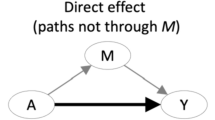Abstract
Several requirements of psychotherapeutic intervention (PI) research are presented. Some major problems are discussed. First, confidence in experimental results may be diminished by interference of possible confounders. A large number of these exist, both physical, perhaps more easily measurable, and psychological or psychosocial. Second, the value and limitations of randomization are presented, with special reference to small N. Validity and reliability are addressed, with emphasis on things that may dilute the strength of both of these measures. Natural remedies are proposed. Internal consistency and reliability are compared and cautions are given regarding their use and possible invalid substitution of consistency for reliability. Comparison of different PIs is commented on, with some relevant examples. Finally, a matter of special interest is discussed: the inconsistency between Spiegel's control survival curve and that produced from local population normative data.
Similar content being viewed by others
References
Bassett MT, Krieger N (1986) Social class and black-white differences in breast cancer survival. Am J Publ Health 76:1400–1403
Berkman LF, Syme SL (1979) Social networks, host resistance, and mortality: a nine-year follow-up study of Alameda County residents. Am J Epidemiol 109:186–204
Ell K, Nishimoto R, Mediansky L, et al (1992) Social relations, social support and survival among patients with cancer. J Psychosom Res 36:531–541
Eysenck HJ (1991) Personality, stress and disease: an interactionist perspective. Psychol Inquiry 2:221–232
Fawzy F, Fawzy NW, Hyun CS, et al (1993) Malignant melanoma. Effects of an early structured psychiatric intervention, coping, and affective state on recurrence and survival six years later. Arch Gen Psychiatry 50:681–689
Fox BH (1995) The role of psychological factors in cancer incidence and prognosis. Oncology 9:245–256
Fox BH (1992) LeShan's hypothesis is provocative, but is it plausible? Advances 8:82–84
Gasparini G, Weidner N, Bevilacqua P, et al (1994) Tumor microvessel density, p53 expression, tumor size, and peritumoral lymphatic vessel invasion are relevant prognostic markers in node-negative breast carcinoma. J Clin Oncol 12:454–466
Grossarth-Maticek R (1980) Psychosocial predictors of cancer and internal diseases. Psychother Psychosom 33:122–128
Le Shan L (1991) A new question in studying psychosocial interventions and cancer. Advances 7:69–71
Lord FM, Novick MR (1968) Statistical theories of mental test scores. Addison-Wesley, Reading, Mass
Morgenstern H, Gellert GA, Walter SD, et al (1984) The impact of a psychosocial support program on survival with breast cancer: the importance of selection bias in program evaluation. J Chron Dis 37:273–282
Psychol Inquiry (1991) Vol 2, no 3 (whole issue)
Richardson JL, Shelton DR, Krailo M, et al (1990) The effect of compliance with treatment on survival among patients with hematologic malignancies. J Clin Oncol 8:356–364
Saad Z, Bramwell V, Duff J, et al (1994) Timing of surgery in relation to the menstrual cycle in premenopausal women with operable breast cancer. Br J Surg 81:217–220
Silvestrini R, Daidone MG, Luisi A, et al (1995) Biologic and clinicopathologic factors as indicators of specific relapse types in node negative breast cancer. J Clin Oncol 13:697–704
Spiegel D (1986) Psychosocial interventions with cancer patients. J Psychosoc Oncol 3:83–95
Spiegel D, Bloom J, Yalom I (1981) Group support for patients with metastastic cancer. Arch Gen Psychiatry 38:527–533
Spiegel D, Bloom J, Kraemer HC, et al (1989) Effect of psychosocial treatment on survival of patients with metastatic breast cancer. Lancet II:888–891
Author information
Authors and Affiliations
Rights and permissions
About this article
Cite this article
Fox, B.H. Some problems and some solutions in research on psychotherapeutic intervention in cancer. Support Care Cancer 3, 257–263 (1995). https://doi.org/10.1007/BF00335900
Issue Date:
DOI: https://doi.org/10.1007/BF00335900




